Preschool music lesson plans are essential for fostering creativity and coordination in young children. These structured guides offer engaging activities, songs, and exercises, making learning fun and interactive. With downloadable PDF resources, teachers and parents can easily incorporate music into daily routines, inspiring little musicians to explore their talents.
Importance of Music Education in Early Childhood
Music education in early childhood is vital for cognitive, motor, and social development. It enhances memory, language skills, and creativity while fostering emotional intelligence. Engaging in rhythm, songs, and instruments helps preschoolers develop coordination and teamwork. Music also provides a foundation for future academic success, making it a cornerstone of holistic education. Incorporating music into daily routines can have a lasting, positive impact on young learners.
Key Features of Effective Preschool Music Lesson Plans
Effective preschool music lesson plans include age-appropriate activities, engaging songs, and hands-on exercises. They incorporate simple instruments, movement, and rhythm games to promote participation. Structured yet flexible, these plans adapt to diverse learning styles and developmental stages. They also emphasize creativity, encouraging children to explore and express themselves musically. Such plans ensure a fun, interactive, and enriching musical experience tailored to young learners’ needs and interests.
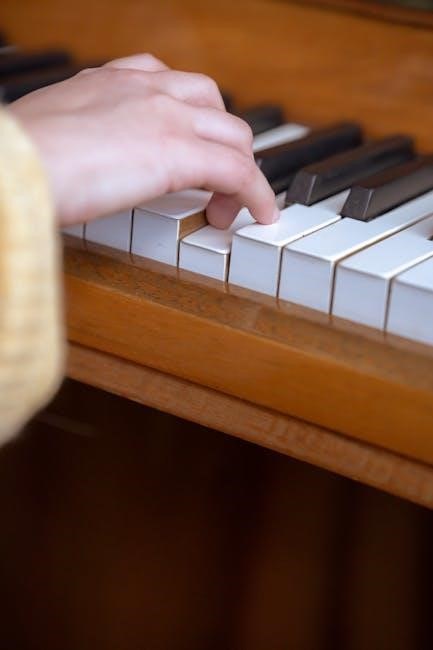
Benefits of Music Education for Preschoolers
Music education enhances preschoolers’ cognitive development, motor skills, and social-emotional growth. It fosters creativity, confidence, and teamwork, laying a strong foundation for lifelong learning and appreciation of music.
Cognitive Development Through Music
Music education enhances preschoolers’ memory, language, and problem-solving skills. Engaging in rhythm games, singing, and instrument play stimulates brain development, improving concentration and creativity. These activities also promote pattern recognition and sequencing abilities, laying a strong academic foundation. Interactive music exercises encourage critical thinking, helping children connect sounds, emotions, and movements. This fosters a deeper understanding of the world around them.
Enhancing Motor Skills and Coordination
Music activities like action songs, rhythm games, and instrument play significantly improve preschoolers’ motor skills. Clapping, marching, and using simple instruments enhance coordination and dexterity. These engaging exercises help children develop balance, timing, and overall physical control. Movement-based lessons also encourage active participation, making learning fun while strengthening their ability to follow instructions and synchronize actions with music.
Building Social and Emotional Intelligence
Preschool music activities foster social and emotional growth by encouraging sharing, cooperation, and self-expression. Singing together and participating in rhythm games help children develop empathy and teamwork. Music also provides an outlet for expressing emotions, teaching children to understand and manage their feelings. These experiences build confidence and create a sense of community, essential for their emotional and social development.
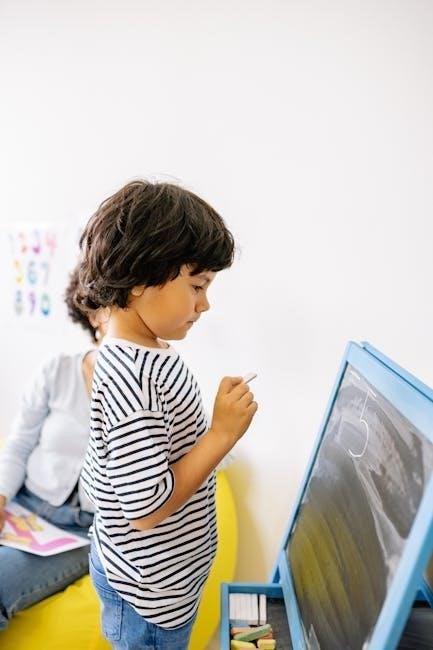
Key Components of Preschool Music Lesson Plans
Effective preschool music plans include age-appropriate songs, simple instruments, and interactive exercises, fostering creativity, coordination, and engagement in young learners through structured yet playful activities.
Age-Appropriate Activities and Songs
Age-appropriate activities and songs are tailored to engage preschoolers, fostering their natural curiosity and creativity. These include simple instruments, movement-based exercises, and sing-alongs designed to promote cognitive and motor skill development. Rhythm games and action songs encourage participation, while fingerplays and storytelling through music enhance creativity. These activities are crafted to be both educational and enjoyable, ensuring young learners develop a love for music while building foundational skills.
Incorporating Musical Instruments for Young Children
Incorporating simple musical instruments, such as tambourines, maracas, and xylophones, into preschool lessons introduces children to the basics of music-making. These tools are designed to be easy for small hands to manage, fostering fine motor skills and creativity. Repetitive rhythms and exploratory play with instruments help develop a sense of timing and musical expression, making learning engaging and fun for young minds.
Interactive and Engaging Music Exercises
Interactive music exercises, such as sing-alongs, rhythm games, and action songs, keep preschoolers engaged and excited about learning. These activities encourage participation, fostering creativity and coordination. Simple exercises like clapping to a beat or following musical cues help children develop listening skills and self-expression. Fun, movement-based learning makes music accessible and enjoyable for young learners, creating a foundation for lifelong musical appreciation and exploration.

How to Incorporate Musical Instruments
Introducing simple instruments like xylophones or drums in preschool music lessons encourages exploration and creativity. Use props and materials to enhance musical expression, making learning interactive and fun.
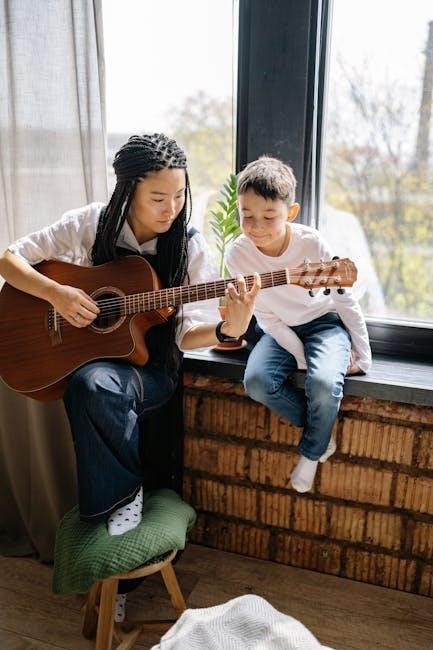
Introducing Simple Instruments to Preschoolers
Introducing simple instruments like xylophones or drums is a great way to engage preschoolers. These tools allow children to explore sounds and rhythms, fostering creativity and motor skills. Many lesson plans include age-appropriate instruments that are easy to handle, making music accessible and enjoyable for young learners. This hands-on approach helps develop their musical awareness and builds confidence in their abilities.
Using Props and Materials for Musical Expression
Props and materials like puppets, scarves, and homemade instruments add creativity to music lessons. These tools encourage children to express themselves freely, enhancing their engagement and imagination. Incorporating visual and tactile elements makes learning interactive and fun, while simple crafts and movement accessories deepen musical understanding and participation.

Interactive Music Activities for Preschoolers
Engage young learners with action songs, rhythm games, and creative movement. These activities foster participation, coordination, and musical exploration, making learning fun and memorable for little ones.
Action Songs and Movement-Based Learning
Action songs are a dynamic way to engage preschoolers, combining music with physical movement. These activities, like clapping, marching, or dancing, enhance coordination and motor skills. Movement-based learning encourages creativity, as children express emotions through gestures. Many lesson plans include simple, repetitive songs that make it easy for young children to follow. This approach not only fosters musical awareness but also promotes active participation and joy in learning.
Rhythm Games and Beat Exploration
Rhythm games are a key part of preschool music education, helping children develop timing and musical awareness. Activities like clapping, marching, or using simple instruments introduce basic beats. These engaging exercises encourage active listening and creativity, making learning fun. Rhythm games also enhance coordination and memory, laying the foundation for future musical skills while keeping young learners entertained and eager to participate.
Creative Movement and Dance Activities
Creative movement and dance activities allow preschoolers to express themselves freely through music. These exercises encourage coordination, balance, and self-expression while fostering a love for music. Simple dance routines, action songs, and prop-based movements engage young learners, making music lessons lively and interactive. These activities also promote creativity and physical development, helping children connect with rhythm in a playful and imaginative way.
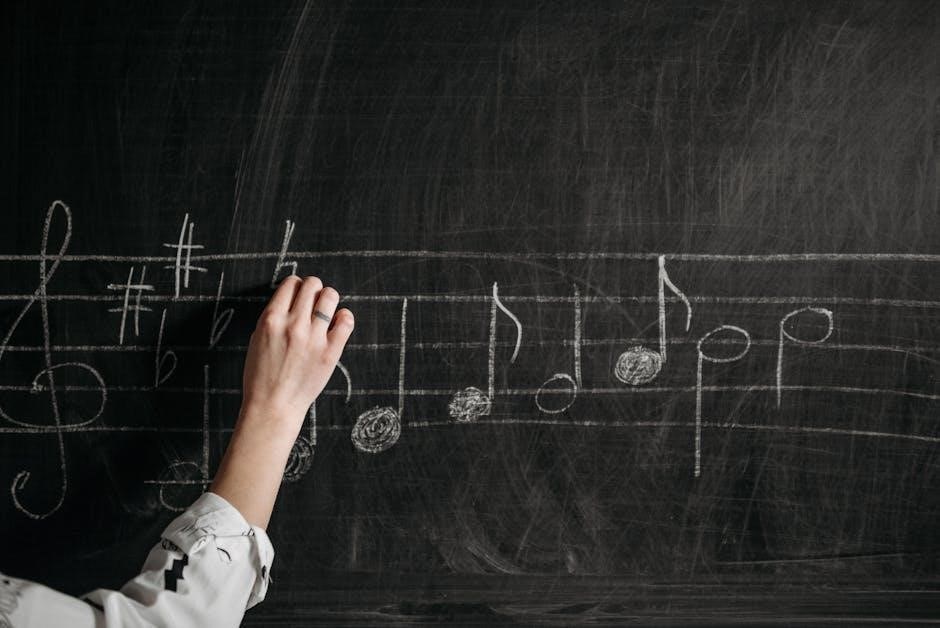
Free Resources for Preschool Music Lesson Plans
Discover free preschool music lesson plans in downloadable PDFs, offering creative activities, songs, and exercises. Online platforms provide accessible resources, making music education easy and fun for teachers and parents.

Downloadable PDF Guides and Worksheets
Downloadable PDF guides and worksheets are perfect for preschool music lessons. These resources include original songs, chords, and visuals, offering a comprehensive approach to teaching music. Many guides feature implementation videos with tips and tricks, making it easier for teachers and parents to lead engaging sessions. Worksheets and activity sheets complement lessons, providing hands-on learning experiences for young children to explore rhythm, instruments, and movement. These tools are designed to be adaptable, allowing for repetition and creativity in the classroom or at home, ensuring a fun and educational experience for all.
Online Platforms Offering Free Lesson Plans
Online platforms provide a wealth of free preschool music lesson plans, offering creative activities and resources. Websites like Music Enrichment for Kids and Teach Preschool Music share downloadable guides, songs, and worksheets. These platforms cater to teachers and parents, ensuring engaging music experiences for young children. With adaptable plans and interactive elements, they make incorporating music into daily routines easy and enjoyable for all.
Tips for Finding Quality Resources Online
When searching for preschool music lesson plans, prioritize reputable platforms offering free, downloadable resources. Look for websites with engaging activities, such as sing-alongs and rhythm games. Ensure the content is age-appropriate and adaptable to your needs. Check for clear instructions and creative ideas that foster musical exploration. Platforms like Music Enrichment for Kids and Teach Preschool Music provide excellent, teacher-approved materials for a fun learning experience.

Long-Term Music Planning for Preschoolers
Design a comprehensive music curriculum with activities progressively building skills throughout the year. Include assessments to adapt plans, ensuring engaging and developmentally appropriate musical experiences for young learners.
Designing a Comprehensive Music Curriculum
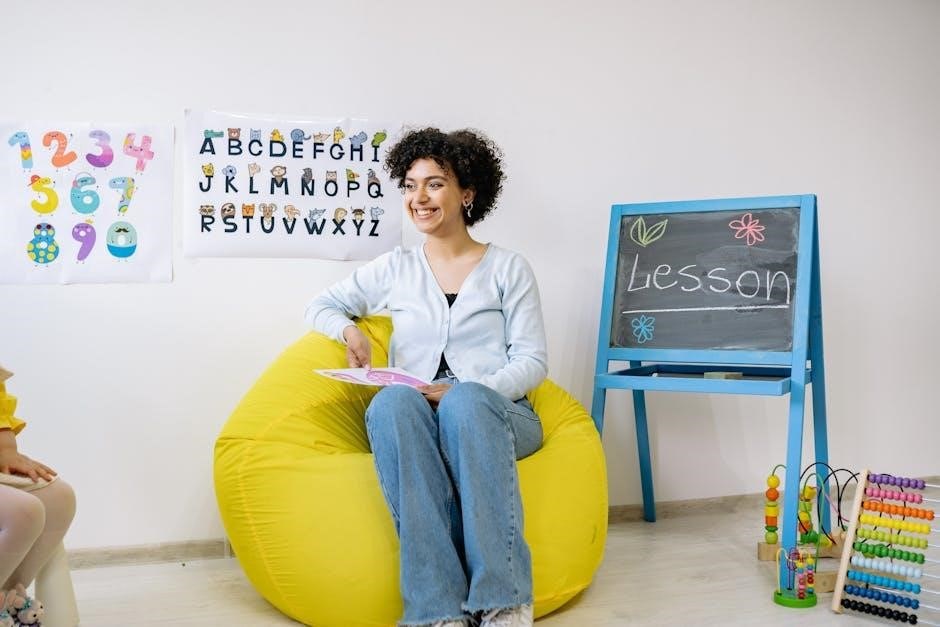
A well-structured music curriculum for preschoolers includes age-appropriate activities, themed lesson plans, and skill progression. Incorporate songs, instruments, and movement to foster creativity and engagement. Use props like puppets and scarves for interactive learning. Ensure each lesson builds on previous skills, with assessments to track development. Plan weekly themes and seasonal units to keep children excited; Make it adaptable to meet individual needs while promoting a love for music.
Progression of Skills Throughout the Year
Preschool music lesson plans should include a gradual progression of skills, starting with basic rhythm recognition and simple songs. As the year advances, introduce more complex activities like instrument exploration and fingerplays. By spring, children can apply these skills in creative projects, such as composing short songs or performing in small groups, showcasing their growth and confidence in music.
Assessment and Adaptation of Lesson Plans
Assessing preschool music lessons involves observing children’s engagement and progress. Teachers should adapt plans based on feedback and developmental milestones. Incorporating flexible activities ensures each child’s needs are met, fostering a supportive learning environment. Regular adjustments help maintain engagement and effectiveness, allowing for a dynamic and responsive approach to music education.
Preschool music lesson plans are a powerful tool for nurturing creativity and development in young children. By incorporating engaging activities and adaptable strategies, educators can inspire lifelong musical exploration and appreciation.
Final Thoughts on Preschool Music Education
Preschool music education is a cornerstone of early childhood development, fostering creativity, motor skills, and emotional growth. With engaging lesson plans and accessible resources, educators can inspire young minds to explore music. Free PDF guides, interactive activities, and adaptable strategies make it easier than ever to integrate music into daily routines, nurturing a lifelong appreciation for the arts and encouraging confidence through musical expression.
Encouraging Musical Exploration Beyond the Classroom
Encourage families to continue musical exploration at home with simple instruments and song sheets. Suggest incorporating music into daily routines, such as sing-alongs during car rides or dance breaks during chores. Provide downloadable PDF guides with activities like rhythm games and creative movement, ensuring learning extends beyond the classroom. This fosters a lifelong love for music and reinforces skills learned in preschool.
